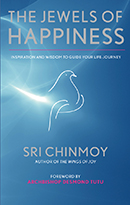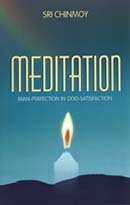Every day there is only
One thing to learn:
How to be honestly happy.

Why do we want to be happy?
Simply ask anyone around you what the ultimate goal in their lives is. They’ll probably answer such things as being rich, getting a new house, starting a family or travelling around the world. If you inquire long enough as to why they would want to achieve those goals, they’ll probably eventually reply (if they don’t get too fed up with your constant questioning of “But why? What for?”): To be happy!
Being happy is behind every single human goal, objective, mission and wish to achieve that “something” that has never truly been defined concisely, but that everyone seems to aim for. The achievement of happiness, the quest for happiness, the search for happiness. The U.S. Declaration of Independence even enshrines, in the words of Thomas Jefferson, “the right to life, liberty, and the pursuit of happiness” as fundamental to the American people.
How can something so vague as happiness, so difficult to explain by anybody that doesn’t have skills in poetry or art or the scientific knowledge to discuss endorphins and dopamine, be everyone’s ultimate goal in their own lives and, if they’re conscious enough, in the lives of their fellow human beings?
Some say that happiness is simply the absence of suffering. Others claim that it cannot be measured on its own, but rather must be scaled against other more measurable values, such as money, work success and stress levels. But as we try to measure happiness against those static or tangible values, we find that they don’t match. Not only does more money fail to guarantee happiness, but sometimes it brings the complete opposite: For some people having less money means less to worry about. Less to worry about, less suffering. Ergo, happier people. Low stress levels don’t equate to happiness either. Some people with a completely full-throttle job with not one second to rest or to relax are happier than people with perfectly safe, secure and stress-free office desk shifts. Sometimes people with no visible stress are miserable.
Since happiness can’t be measured with more or less money, more or less stress, more or less possession of degrees and titles and property, we need to ask ourselves a question. This is not an easy question, but it opens our minds to a hint of the answer. Here goes:
Are we wasting our time looking for happiness?
Why would I ask such a strange question? Haven’t I just stated that happiness is what moves us? Isn’t true happiness what everyone wants to achieve – to be able to proudly claim, at the end of their days: “I’m a happy person”? Then why would looking for happiness be a waste of time?
The question hints at the answer. And the answer is because happiness can’t be looked for, or searched for, or obtained. We can obtain more money. We can obtain a relaxed life. We can obtain a safe environment. Sure, these things seem to make it easier to become happy persons. But we can’t obtain happiness, the same way we can’t obtain “wise” or “better.” It’s not something we can have; it’s something we just are. We can be happy, not obtain happiness. And if we know we can be happy, the same way we can be wise, we can be better or we can be loving, then the next question is “What can we do to be happy?”
Ah, that opens up a new set of possibilities. First, anything we do could set us in the “happy” state of being. We could be happy while driving, while cooking, while playing with our kids, or while filing a tax return form. If we are conscious of what we are doing and really experience the whole set of feelings that surround our actions, we discover that happiness is among them. So happiness is our state of being! It’s not something out there, waiting to be found and claimed. It has been within us, intrinsic to our existence, this whole time.
Knowing this, we discover some other interesting things: When we are truly happy, we want others to be happy. So the more we make others happy, the happier we become. When we are truly happy, we don’t need anything else. We just enjoy the moment. So the more we live in the present, and the less we need, the happier we are. And lastly, when we are truly happy, we find that there’s no need to obtain, to possess, to search for anything. Happiness is all inside us; in fact, it is us. The goal has been conquered, for the goal and the seeker are one.
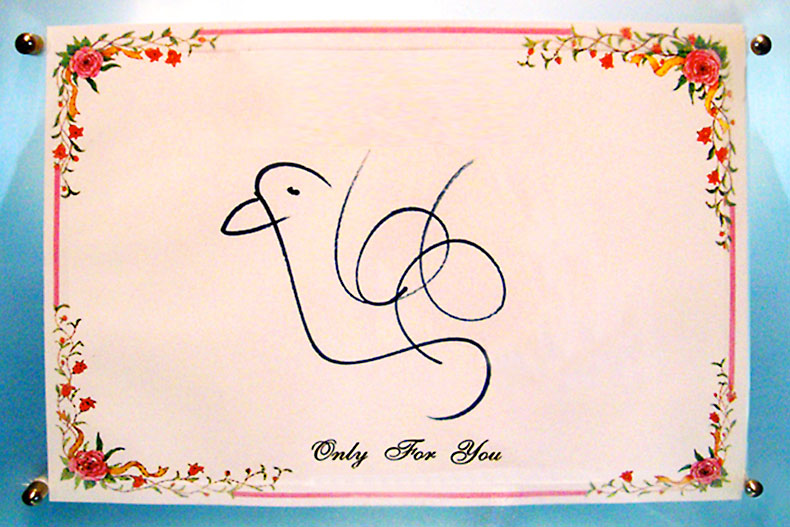
Poems on Happiness – from Twenty-Seven Thousand Aspiration Plants
Despite being known for such important guides to wellbeing as The Wings of Joy and The Jewels of Happiness, Sri Chinmoy infinitely preferred writing poems and aphorisms to prose. In 1983 Sri Chinmoy began the second of his three large epic collections of aphorisms, Twenty-Seven Thousand Aspiration Plants. The series was completed 15 years later, in 1998.
Each of the poems in the series are notable for their simplicity and directness. They are meant for reading in silence, allowing each poem to resonate inside the heart. Sri Chinmoy actually recommended reading each poem twice in this way to create a beautiful mantric effect. The following aphorisms on happiness were compiled by Kakali Atkin. The bird drawing above is one of 16 million that Sri Chinmoy drew between 1991 and 2007, a bird in flight being a beautiful metaphor for the joy and freedom of the human soul.
223.
Not to renounce
And not to enjoy.
Not to be an ascetic
And, again, not to be
The world’s greatest epicurean.
This is the path
To true happiness.
784.
Your own sincere search
For yourself
Will become a synonym
For perfection happiness.
2055.
What are you doing?
Can you not hear
That your soul
Is summoning you?
Can you not see
That real happiness-petals
Are blossoming within you?
4691.
If you do the right thing,
Even if you become the target
Of wild criticism,
Your inner happiness
Will eventually prove to you
That God has always
Been pleased with you.
5604.
In this world we kill ourselves
All for outer success.
But there is another world
Where our happiness
Does not depend on outer results.
5623.
Let at least one member
Of your inner family
Listen all the time to the soul.
Its progress, happiness and satisfaction
Will immediately inspire
The other members to follow.
5981.
You do not belong
To your unfortunate failure-past.
You completely belong
To the happiness of tomorrow’s
Vision-reality.
5988.
Each negative thought
Has the capacity
To destroy immediately
Your life’s happiness-core.
6439.
Where
Is my happiness?
It is inside my peace
And nowhere else.
6463.
When each man longs to live
In his happiness-house,
God grants him
His Immortality’s Oneness-Home.
8291.
Come out of your mind.
Let your heart love you
And claim you.
You will then feel
What true happiness is.
8300.
You follow
Your heart’s love.
Your life’s happiness
Will follow you.
9027.
Slowly and steadily
But unmistakably
Your happiness can blot out
Your life’s age-old depression.
9698.
You are your mind’s
Twenty-four-hour wishful thinking,
Yet you have no happiness.
If you can grow into
Your heart’s self-giving,
That will give you joy beyond measure.
9729.
Train your mind
To obey you.
Train your life
To surrender to your heart.
Happiness will be
Your permanent property.
9995.
God does not want you to repay Him.
He just wants you to remain
A happiness-prince on earth.
10,874.
Happiness in cheerful self-giving
Is beyond compare.
It is the highest delight
That God has created for humanity.
10,903.
A life of happiness
Does not cost anything.
Just give and give
And do not expect.
Lo, the universal happiness
Is all yours.
11,028.
No happiness can be seen,
No happiness can be felt,
Without the heart’s
Peace-smile.
12,459.
No fame can buy
Any lasting happiness.
True happiness is in
Sleepless self-giving.
12,649.
Every morning shake hands first
With your happiness-satisfaction-friend
Long before you enter into
Your daily life-activities.
13,242.
Happiness comes from the feeling
That this world needs
Absolutely nothing from me.
13,271.
You must never forget
That greatness
Does not guarantee happiness,
But goodness always does.
13,996.
If you want to choose happiness in life,
Then choose willingness first;
Happiness will automatically follow.
15,043.
How can you survive
If there is no happiness
In your heart?
How can you survive
If there is no cheerfulness
In your mind?
How can you survive
If there is no eagerness
In your physical existence?
15,172.
O my mind,
Do not doubt your heart.
Your heart is your real friend.
Give your heart a chance
To erase your failure-fear.
It will succeed,
And real happiness
Will fast approach you.
16,571.
A little smile
Is a solid step
Towards an abiding
Happiness-heart.
16,801.
The heart needs happiness
At every moment
So it can move forward,
Dive inward
And fly upward.
16,832.
Every day
You can inspire others
Through your sincere concern
For humanity’s happiness and progress.
16,973.
Each aspiring heart
Is destined to be flooded
With sweetness-happiness-fragrance.
19,370.
The more we walk towards happiness
For our personal gain,
The farther away we go
From true happiness-shore.
19,597.
Whenever I am in the company
of my mind,
It gives me a very hard time.
Whenever I am in the company
of my heart,
We mutually give each other
Blossoming happiness.
Alas, I do not know why and how
I still spend so much time with my mind.
23,891.
Happiness, happiness, happiness –
Only happiness within
And happiness without
Can free the bondage-chained life
Of humanity.
24,299.
If happiness exists on earth,
Then it will be found
Only in one divine virtue:
Forgiveness.
24,697.
Happiness
Is our heart’s perpetual journey,
And not a remote destination.
26,045.
Only the day the mind believes
In the heart’s messages
Will the mind have happiness.

The Jewels of Happiness – A Personal Review
One of the recurring themes in the writings and legacies of the great spiritual teachers all the way down through time is the accent they each place on the preciousness of a human incarnation, especially one in which there is some kind of spiritual awakening. One of India’s teachers spoke of only three real miracles: the rarity of a human birth in this infinitely vast cosmos with its endless possibilities of life; a human incarnation characterized by spiritual awakening and interest; and the culmination of these in finding your inner path and an enlightened teacher to guide you along the road to your own enlightenment.
Part of Sri Chinmoy’s vast legacy, The Jewels of Happiness is an inspirational road map for those seeking wisdom and knowledge, the travelers on the inner journey seeking happiness and fulfillment. It offers a compendium of gold nuggets, lovely visualizations and positive imagery, a sense of hope and the promise of an imminent peacefulness. I really like its focus on meditation and the confident assertions about God.
One of the things that always interests me about meditation is the feeling of close-by discoveries, a sense of being near to a sudden insight or an understanding that can make your life different. Or a veil that could part to show you something, making you happier or closer to God, a little enlightenment experience that could come suddenly like a rainbow in your day. They seem to be a gift rather than an achievement, and though they rarely come, even the promise of them lifts your heart. Reading The Jewels of Happiness encourages me in this way, its sense that happiness and freedom are very close, that God has such an immense love for us.
As my own years multiply I find meditation to be more of an abandonment to God than anything, perhaps recognizing that after a lifetime of struggles and strivings, we haven’t really got the foggiest notion about anything, and that we can’t really reach the loftiest heights on our own. After so many years, after all the meditation practice and self-discovering and immersion in a path, there is a humbling sense of our littleness. Yet in his book, Sri Chinmoy encourages this feeling of being a child and having a child’s innocence, purity, sweetness, simplicity, its helpless dependence on the loving parent.
In a world full of outer enchantments and endless distractions, the great light, beauty and purpose of the human soul becomes lost to us, covered over just as easily as a single cloud can hide the power of the sun. But The Jewels of Happiness brings back to us the sense of our sacred purpose; encouragement and reassurance; the promise of joy and delight; the nearness of God. Sri Chinmoy has mapped out a lovely guidebook for those embarking upon the eternal journey, an exemplar and teacher pointing our way back home.

Why We Are Motivated by Happiness
We humans do have some sense. If we are normal, healthy individuals, we don’t do anything unless we believe that it will benefit us positively in the end and bring us happiness. But usually we are unconscious of this fact.
When we try to become a millionaire, we’re doing it not for the money itself, but because we feel all that money will be able to give us a happy lifestyle. Even if someone sacrifices their own personal happiness for the cause of their country or some noble cause, they’re doing it only because they feel that by this sacrifice they’ll be able to achieve a deeper kind of happiness, or give happiness to others. It seems we are just built with a want and need for happiness.
J.S. Mill put it this way: “It’s impossible to desire anything except in proportion to its pleasantness. Human nature can desire nothing which is not either a part or a means of happiness. This is proof that happiness is the only thing desirable. People’s ideas of how to be happy can have more or less wisdom though.”
To say that happiness is the only natural purpose of human life and that everything else is just a means to that end, makes more sense of happiness than our common sense usually cares to notice. That’s why it seems so appealing. It makes common sense more sensical.
It’s no real surprise that all through the history of Western philosophy most of the great minds have made more or less the same observation that happiness should occupy the central position in human life. I like this fact. It immediately brings a kind of humility to philosophy. It says, “As a result of our, the great philosophers, expert philosophical cogitation, we’ve decided happiness is the most important thing.” Happiness is a very simple principle. You don’t need to be a philosopher to understand, value and pursue it. For me, to say happiness is the most important thing is to capture a snapshot of human nature and the nature of human consciousness that seems quite insightful.
For a quick survey of famous Western philosophers who gave happiness an especially central place in the scheme of things, we could start with Epicurus, who lived around 400 BC. His foundational principle of “pleasure” wasn’t pleasure in the sense of material or physical desire. It was what wisdom would achieve, and it involved avoiding the lesser pleasures because they actually stood in the way of the higher enjoyments. For him, this was the highest thing for which an individual can aspire.
Some other milestones in Western thought on happiness:
- Pyrrho, an ancient Greek teacher, regarded the value of knowledge with scepticism, and taught that happiness is to be found as an inner state, a feeling.
- Diogenes, 400 BC, rejected the complications of social life and thought happiness and freedom could be won through mastery of the self.
- The Roman emperor Marcus Aurelius had some fairly definite ideas about the nature of happiness, saying that “to live in happiness depends on very few things” and “the happiness of life depends on the quality of our thoughts.”
- Augustine, Christian saint, great writer and one of the fathers of the Church, expressed it like this: “Who wishes anything for any other reason than that he may become happy?” He felt it was wiser and more benefitting a man “to be obscure in the house of Felicity, than to be eminent without her in their own places.”
- In the words of the French philosopher Montaigne, “All the opinions of the world agree on this – that pleasure is our goal – though they choose different means to it. Otherwise they would be thrown out right away. Who could listen to a man who would set up our pain and discomfort as his goal?”
- Happiness was central to the thinking of Thomas Jefferson, founding father of the USA. This is probably made most famous by the prominent mention of human happiness in his Declaration of Independence. He sings the praises of “America, where the equal rights and the happiness of every individual are acknowledged to be the only legitimate objects of government.”
- Leo Tolstoy said, “Happiness is the soul of every child.”
- To use philosopher of religion William James’s phrase, I think happiness would rank pretty high in a list of “all the great single-word answers to the world’s riddle.”
- A recent introduction to philosophy says something that is relevant to the present topic. “Valuing material goods more than life itself is a very serious self-defeating ethical error.”
So the idea of happiness as the most important thing in life has been around in the West, in the greatest minds, since the beginning of recorded history. Something that almost everyone agrees on is that happiness should go together with wisdom. Wisdom teaches that happiness depends more on our inner attitude than our outer material prosperity.
Meditation is one very effective way to adjust the focus in our everyday life, so that our happiness does not depend so much on material objects and the outer situation. In the words of Sri Chinmoy, my meditation teacher, “True inner joy is self-created. It does not depend on outer circumstances.” We don’t escape from the ordinary life in order to focus on our own inner happiness, but rather we accept life as it is with a view to transforming it.
If we have spiritual happiness, that is, happiness that is not dependent on our outer life, then there’s no need to retreat from the world. Our outer circumstances don’t control our happiness if the source of our happiness is elsewhere. Even if we meet with adversity, or circumstances that don’t meet our hopes or expectations, our happiness can’t be affected for long. We can always return to it, or it always comes back to us.

The Quest for Happiness: Different Approaches Throughout History
It might be interesting to have a look at the philosophical development of happiness in a historical context. A good place to begin a search for happiness might not be in Europe during the Middle Ages where life must have been pretty hard for most people, with seemingly constant wars, the threat of disease, hunger and religious superstitions all rife. Especially it would seem so for women. (Please don’t burn that witch, before she cooks me my dinner!) For many, the idea of dying and going to a beautiful heaven was all that was worth striving for! The Renaissance began a new chapter in Western history and the development of perhaps a new meaning of happiness.
Take for instance Francis Hutcheson, who was born in 1694 in Ireland to Scottish parents and later moved back to Glasgow. He is generally regarded as the founding father of the Scottish Enlightenment. He believed that man universally carried within himself the means to learn how to be virtuous and helpful to others. Men served others not because they had no choice if they wanted to get along with others, but because they realized they actually enjoyed doing it. (By the way, women still really had no choice in it!) He believed that helping others suffused us with a sense of well-being and pleasure. Being good meant doing good to others. Virtue (and to some extent the Ten Commandments) required it, but our feelings confirmed it.
The link between feelings and happiness was important. Human beings were born to make each other’s lives more pleasant, and to be wicked or vicious was to be miserable and unhappy. A delight in the good of others becomes the basis of our sense of right and wrong. We decided that what helps and pleases a person is good because it gives us pleasure. What injures him is bad because it causes us pain. Men begin to realize that the happiness of others is also their own happiness. Some vulgar people assumed, mistakenly, that happiness meant the gratification of physical desires: food, drink and sex. But for Hutcheson, the highest form of happiness was making others happy. The desire to be moral and virtuous, to treat others with kindness, and the desire to be free were universal, and human beings wanted them because it made them happy.
Thomas Jefferson’s Declaration of Independence in 1776 enshrined these same ideals in writing for the American people. Jefferson believed that happiness was the aim of life, and that virtue was the foundation of happiness. He wrote, “All men are endowed by their creator with inherent and inalienable rights; among these, are life, liberty, and the pursuit of happiness.”
However this view was not held universally by all around that time. Lord Kames (a Scottish lawyer) argued that morality arose from human aspirations rather than divine ones. Kames believed that happiness came from the acquisition of property and that laws to protect the possessions that were honestly acquired formed the focus of good governments (rather than the pursuit of the common good). Probably at that time most of the poor were barely able to honestly acquire a loaf of bread! Kames said that “Man is disposed by nature to appropriate. My property is an important part of my sense of self, an important sense of my personality. Property makes me a whole and complete human being.” The happiest society (presumably full of happy citizens), Kames concluded, was where the progress of capitalism polished the manners of men, whereas uncivilized peoples lacked the self-interest of personal ownership to interact in a happy and productive way.
It seems now that Kames’s view became the mantra of progress throughout most of the populations of the developed world and the common incentive for many in the developing nations. So was he right?
Well, about a hundred years later, in 1983, a man from India came to America and gave an address at the Parliament of World Religions in Chicago. Swami Vivekananda lectured about Vedanta (the knowledge of the Vedas, India’s holy scriptures). He introduced the idea that this world is an illusion and that, as he put it, “God is only true, the world is not true. Let the world fall to ruin around my ears: I do not care. So with the next life, I do not care to go to heaven. By going to heaven we only prolong the miserable illusions. In heaven you become gods, drink nectar, and get rheumatism.”
If the world is indeed an illusion, as Vivekananda argues, then it follows that we, being part of the material world, equally are just an illusion, formed somewhere in our brains by the decoding of the duality matrix surrounding us. Philosophically then, any feelings I may have are also illusory, including happiness, (or lack of it). Swami Vivekananda taught that, “God is the only reality, and that the real in me is God. Thou art That. Thou art the Reality!”
The question then becomes, “Is God happiness?”
Sri Chinmoy, the author of The Jewels of Happiness, offers one insight in the form of a sweet conversation-poem between the spiritual seeker and God:
My Supreme Lord,
What is the difference
Between happiness and delight?“My child, happiness is an experience,
And delight is a reality
That transcends experience.”
Here Sri Chinmoy suggests that God is in fact Delight, a higher level of consciousness that transcends happiness. Therefore a more perfect way of defining happiness may be that it is an illusory experience that we can experience in this illusory world. However, if we can break or suspend the illusion and identify ourselves with or as the real Reality, then it is possible for us to transcend the dualities of happiness and pain, and become Delight itself. Many great spiritual teachers over the ages have expressed the notion that this is the true reason and meaning to our lives, a higher purpose often simply expressed by the term “oneness” (as in, I and my Father are one).
In 1976, Sri Chinmoy offered a university lecture entitled Happiness. In the lecture he writes, “Happiness can be found only in our conscious surrender to God’s Will. Right now, here on earth, we enjoy false happiness in the body, vital, mind and heart. But there comes a time when real happiness, divine happiness, dawns. At that time the body is fully awake and consciously offering its service-light, the vital is dynamic, the mind is calm and quiet and the heart feels its oneness, its inseparable oneness, with the rest of the world.”
So a goal of life may be stated as: “to integrally raise one’s consciousness to become one with Delight, and thus having removed the illusion of duality, to live in the world in constant Delight as a service to others who have not yet attained to this goal.”
On the road to this goal, a pertinent question would be whether or not it is preferable to experience happiness or sadness? Well, that depends on you. If you know both as an illusion then you might want to try both (as most of us have). It is generally accepted in society that happiness is a preferable state to live in than sadness or depression. In fact, a huge array of industries, pastimes, and distractions have all been developed to try to create and maintain a sense of happiness for people all around the world.
Some people have believed the opposite to be true. For example, in the Mahabharata, a classical Indian epic, Kunti, the queen of the Pandava family, preferred to live in a state of misery rather than happiness because she felt this enabled her to rely more on Sri Krishna, the incarnation of the Divine at that time.
At the present time, many people seem to be caught in an unconsciously depressive and destructive way of living. Many are unable to change their reality. The high rates of suicide, drug, alcohol and gambling addictions, and violence particularly among young people, may be partly attributable to a general unhappiness in our communities. Most governments try to address this problem by maintaining low levels of unemployment.
So an historical look at the state of happiness reveals a changing and diverse range of meanings. What the future holds is really up to individuals to create for themselves. However in the area of happiness, it seems that throughout history there has been one common thread, and that is, to “Know thyself” is to know true happiness.

Moments of Meditation
A deep meditation is one of the most memorable and fulfilling of all our life experiences. Once we have learnt how to find our way into that desireless inner stillness that is always there inside us, our life is never really the same. Free of time, thought and the burdens of the mind, everything seems clear, everything seems gratifying to us. Out of this silence comes wisdom, understanding and delight.
I like the practicality of Sri Chinmoy’s teachings and writings, his loving acceptance of the world. He teaches us to take our practice of meditation into the everyday aspects of our life – karma yoga – and to understand that our entire life is our spiritual life, every tiny part of it. Walking through a park, sitting on a bus, waiting for somebody, travelling from one experience to the next – every moment is an opportunity to be our very best and happiest and highest. And then to string these moments together as a necklace of day-long happiness moments, a continuum of spirit.
A wave rider makes the effort to reach and finally catch the wave that will carry him ashore. The student of meditation also strives in his practice, and eventually his own gradual awakening grows into a wave of spirit that sweeps him beyond thought and technique. He finds and rides the forgotten ocean of joy that has always been there inside him. This is why we need to commit to regular practice, the accumulation of all the tiny breakthrough moments; and to have patience and discipline, to find and catch the rising wave.
At first, the experience of meditation itself relies upon environment and some combination of time, place, correct technique. But then it goes beyond these needs. We begin to realize that while our increasing moments of “success” have been possible through some combination of factors – a workshop we attended, group practice, a new exercise we tried, or inspiring music – in reality they merely reconnected us with our deeper self, and that “self” is always there inside us, wherever we are.
Sri Chinmoy wanted us to understand our own capacity to uplift and serve the world, reminding us that “every human being is a very special dream of God” and that meditation will take us past our identification with our body, thoughts and personality to a deeper understanding of our ultimately God-like nature. The space in our lives where we put aside the burdens and preoccupations of the day’s dramas, silence our thoughts, venture past the many attachments and distractions of the mind to a growing stillness, this space allows us to rediscover the very source of all our creative, intuitive, spiritual capacities. The closer we move towards this “intelligence of silence,” our “inner pilot,” the more perfect our outer lives become.
Meditation comes easily today, sitting on the grass in a park in Auckland under a wide blue summer sky, a sky of such startling clarity and endless transparency as to illumine things and gather close the silhouettes of far-off, familiar mountains. There is this lovely sense of stepping outside of the story of one’s life into a state of just “being,” at rest in the here-and-now, a lovely inner space of pure consciousness. Over in the western corner of the park, the tai-chi practitioners are also touching the lives of strolling passers-by, their calm and gentle movements reminding of other realities beyond the ordinary. And I remember Sri Chinmoy’s words, reminding us that we co-create this world and that “Just one smile from my gratitude-heart immensely increases the beauty of the universe.”
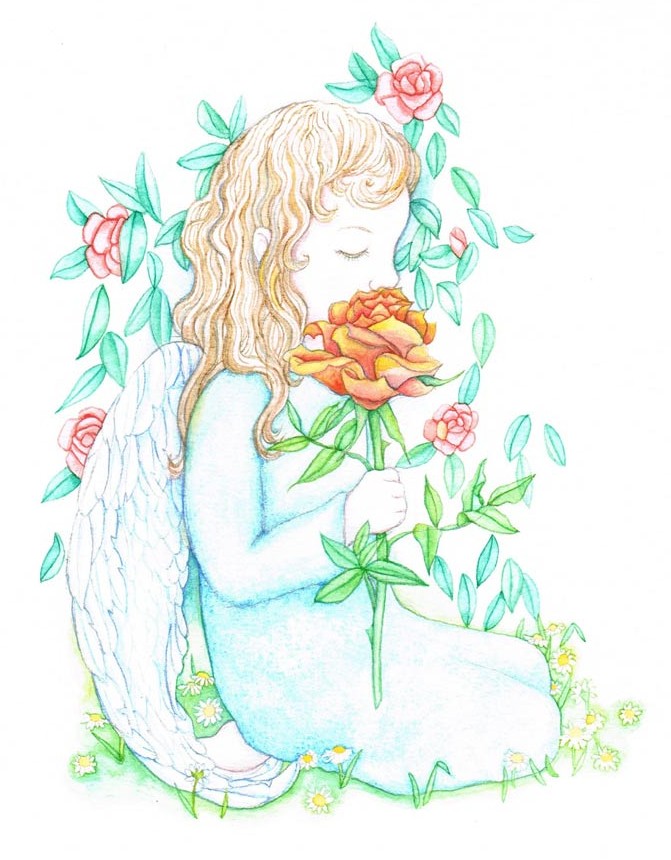
Happiness in the Fragrance of a Flower
I am an artist rather than a writer, so the picture above is my contribution to this site. One frequent theme in the writings of Sri Chinmoy (author of The Jewels of Happiness) is that we can have joy and happiness if we feel we are children running from flower to flower in a beautiful garden and then imagine that we have this garden inside our heart. For example, in answer to someone asking about beginning to meditate, Sri Chinmoy gave the following advice:
A beginner has to feel that he is a child, no matter how old he is in earthly age. A child’s mind is not developed. When he is twelve or thirteen his mind starts functioning on an intellectual level, but before that he is all heart. Whatever he sees, he feels is his own. He identifies spontaneously. This is what the heart does. When you feel that you are a child, immediately feel that you are standing in a flower garden. This flower garden is your heart. A child can play in a garden for hours. He will go from this flower to that flower, but he will not leave the garden, because he will get joy from the beauty and fragrance of each flower. Inside you is the garden, and you can stay within it for as long as you want. ((Sri Chinmoy, Mind-Confusion And Heart-Illumination Part 2, Agni Press, 1974))
One of the things that makes me feel happy is smelling the fragrance of a beautiful flower like an old-fashioned rose. To me the things in Nature are the most beautiful, and the fragrances of flowers – roses, daphne, jasmine, gardenias – are the most exquisite scents that exist on Earth, and all are God-made. My name, Nabhoniya, means “Directly from Heaven’s Beauty and Fragrance…” so I suppose it is not surprising how much joy the heavenly fragrance of a beautiful flower can give me!
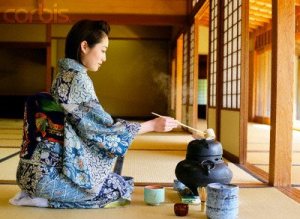
How Small Things Can Make You Happy
In my job as a freelance journalist, I recently interviewed a composer who had spent some time in Japan. He told me what struck him most was the Japanese reverence for mundane and ordinary things. For instance, when he would order bread in a bakery the salesperson would go out of his way to gift-wrap the bread as if it were a birthday present. He was confused and deemed the meticulousness a sheer waste of time, until he witnessed a tea ceremony and realized it was a way of life. He discovered that the secret to the Japanese soul, and consequently the secret to their happiness, is their ability to see sacredness in the little things.
The little things. In the West we tend to take them for granted. They are of minor importance, sometimes even downright intimidating. “The devil is in the details,” we say. It is the big things that matter. We long for an empire, a masterpiece, a legacy. Living large is the yardstick of success. Big things also predominate our religious beliefs. We feel that Truth and God live in high, unattainable heavens, far beyond the scope of our day-to-day lives. But the Japanese have discovered God in the small things.
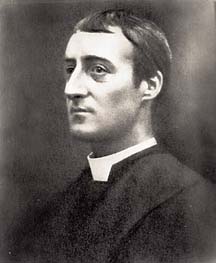 The poet Gerard Manley Hopkins wrote, “The world is charged with the grandeur of God…there lives the dearest freshness deep down things.” Hopkins realized that the key to happiness lies in the little things, the “dearest freshness” underpinning all life in the Universe. Seeing that divine freshness is an art that stems from a clear consciousness. This art is sometimes called “mindfulness.” When we are mindful, we live fully in the present moment, the eternal Now. We move out of the clouded firmament of our mind with its restless thoughts and enter into the lush garden of our heart. It is when we are in the heart that we see and feel the inherent beauty of life. There we discover the “dearest freshness” in countless little things: the song of a bird, the colour of a leaf, the smile of a child. Little things are the winks of an ever-benign Universe.
The poet Gerard Manley Hopkins wrote, “The world is charged with the grandeur of God…there lives the dearest freshness deep down things.” Hopkins realized that the key to happiness lies in the little things, the “dearest freshness” underpinning all life in the Universe. Seeing that divine freshness is an art that stems from a clear consciousness. This art is sometimes called “mindfulness.” When we are mindful, we live fully in the present moment, the eternal Now. We move out of the clouded firmament of our mind with its restless thoughts and enter into the lush garden of our heart. It is when we are in the heart that we see and feel the inherent beauty of life. There we discover the “dearest freshness” in countless little things: the song of a bird, the colour of a leaf, the smile of a child. Little things are the winks of an ever-benign Universe.
In order to live in the heart, meditation is helpful. Meditation teaches us how to silence our thoughts. When the mind is calm and tranquil, the heart automatically comes to the fore and opens itself like a flower. It takes time and a little discipline to learn how to meditate, but the benefits are beyond measure.
For when we live in the heart, life is always full of joy. You feel the happiness of a seven-year-old, where every day is full of surprises, newness and joy. A child’s world is composed of hundreds of little things, and he sees meaning in all of them. Perhaps that is why the child is so happy.
My spiritual teacher Sri Chinmoy was the happiest person I have ever known. He was also the most meticulous person I’ve ever known when it came to the small things. Although he had thousands of students, he always made you feel through some small act of kindness that he saw you and loved you.
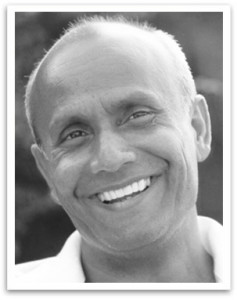 My outer relationship to my teacher was mainly confined to running, since I was one of the faster runners in our meditation centre and Sri Chinmoy took interest. Once during a Christmas retreat in Bulgaria, he filmed the finishers of the weekly two-mile race in which his students participated. In the evening he showed his video to us on a big screen. I happened to win that race, but Sri Chinmoy only started filming just after I had finished. It meant that everybody was in the video except for me, which made me a little sad. After all, I had won it!
My outer relationship to my teacher was mainly confined to running, since I was one of the faster runners in our meditation centre and Sri Chinmoy took interest. Once during a Christmas retreat in Bulgaria, he filmed the finishers of the weekly two-mile race in which his students participated. In the evening he showed his video to us on a big screen. I happened to win that race, but Sri Chinmoy only started filming just after I had finished. It meant that everybody was in the video except for me, which made me a little sad. After all, I had won it!
But the moment the video ended, Sri Chinmoy called out from his chair, “I am so, so sorry I missed Abhinabha! He was too fast for me.” I immediately felt consoled, but it didn’t end there. Although it was not his habit, Sri Chinmoy also filmed the next race, and this time made sure he captured me. Again he showed his video to us in the evening and started applauding when I came in first. That little act of kindness and concern made me so happy, because it made me feel truly loved.
When I think of little things, I think of these small acts of kindness. Whenever I happened to miss one of our weekly meditation sessions, one of my friends would always leave some prasad (blessed food) in my room from that meditation. It was an unspoken act of kindness that always put a smile on my face. When I was younger I used to write letters to my best friend, who lived on the other side of the country. Every time one of his letters came, I was in the seventh heaven of delight. Nowadays we just send an e-mail, but it’s not the same as the simple magic of a handwritten message.
 It is rightly said that he that will not stoop for a pin will never be worth a pound. So if you are looking for happiness, start with the little things. Go for a walk outside and appreciate nature’s beauty. Write a letter to a friend you haven’t seen for a while. Tidy up your room or house and enjoy that pure feeling of a clean living space. Like the Japanese, honour the details. And while doing so, try be fully present in the moment. When we take the small things seriously, we hone our good qualities and build up our character. Then when the big things wheel around, we’ll be ready to face them with courage and dignity.
It is rightly said that he that will not stoop for a pin will never be worth a pound. So if you are looking for happiness, start with the little things. Go for a walk outside and appreciate nature’s beauty. Write a letter to a friend you haven’t seen for a while. Tidy up your room or house and enjoy that pure feeling of a clean living space. Like the Japanese, honour the details. And while doing so, try be fully present in the moment. When we take the small things seriously, we hone our good qualities and build up our character. Then when the big things wheel around, we’ll be ready to face them with courage and dignity.

I Am Happy – A Poem
I am happy
I made the decision
To work to live
Not live to work
I am happy
I always try to
Look for the good in people
And
Look for the good in myself
I am happy
I know I am not perfect
I am bound to make mistakes
But
Nobody is perfect
Everybody makes mistakes
I am happy
I don’t take myself
Too seriously
I laugh at myself
And
Allow others to laugh at me too
I am happy
I like to challenge myself
To do what my mind tells me is
Impossible
Until it is
Possible
I am happy
I know there is somebody
Who loves me
And
Cares for me
More than I will ever know
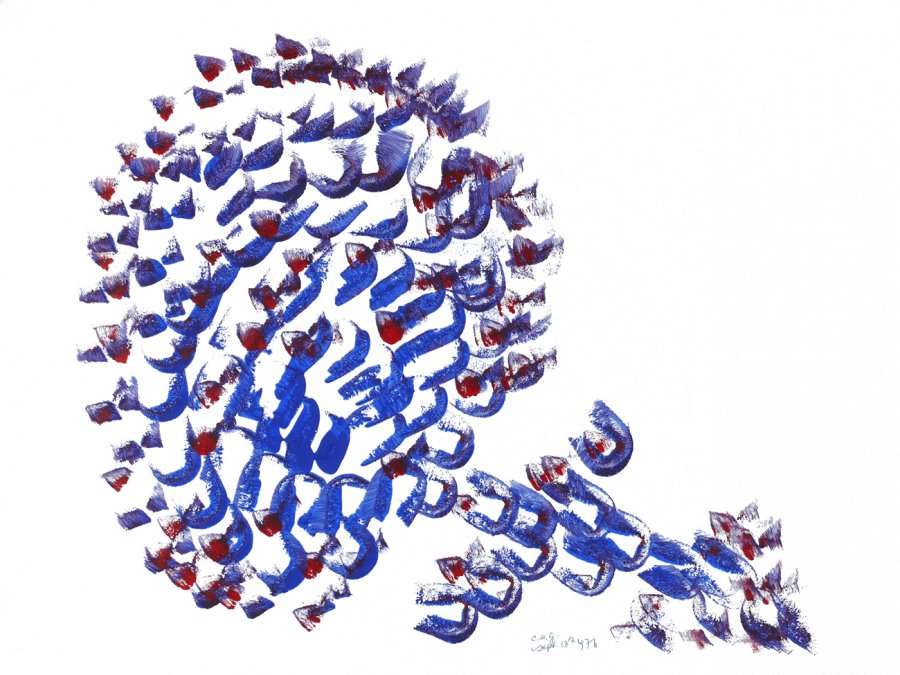
Thoughts on Happiness – from Seventy-Seven Thousand Service-Trees
The Jewels of Happiness is a compilation of Sri Chinmoy’s prose writings, but Sri Chinmoy himself infinitely preferred writing poems and aphorisms to prose. In 1998 Sri Chinmoy began his largest collection of aphorisms and poems to date, Seventy-Seven Thousand Service Trees. He said at the time that he did not expect to live to see it completed, but that he had an inner command to start, and he was dutifully obeying that inner command.
By the time of his passing in 2007, he had completed 50,000 poems in this series – 50 volumes of 1,000 poems each. The poems have a tremendous simplicity that bypass the mind, creating a haiku-like sensation of stillness in the heart. The following aphorisms on happiness were compiled by Kakali Atkin. The poems were numbered from 1 to 50,000, and the number for selected each poem is shown here. The above artwork is from the vast collection of Sri Chinmoy’s Jharna Kala (Fountain-Art).
27,174
A heart of compassion
Is the real possessor
Of happiness.
28,149.
I must share my happiness
With the rest of the world
To make my life
Meaningful and fruitful.
28,515.
The inner happiness
Never depends on
Outer happenings.
28,669.
Happiness grows
In the fertile soil
Of love.
29,109.
When I share
My happiness,
I multiply it.
29,344.
My inner happiness
Cures
My outer suffering.
30,207.
Conquer the doubting mind.
True happiness
Will immediately be yours.
31,787.
My gratitude-heart
Can only create for me
A happiness-universe.
31,985.
Only a happiness-smile
From our heart
Can cure our outer life.
32,343.
Material happiness
Is short-lived
And very shallow.
32,406.
Service
Is the secret
Of true happiness.
32,457.
A heart of sympathy
Is a life of happiness,
Indeed.
33,071.
My soul came into the world
To radiate happiness
Here, there and everywhere.
33,096.
Each divine thought helps me
Spread happiness-sunshine
From my heart.
33,271.
I can make each minute
Beautiful, soulful, cheerful
And fruitful
If I maintain my inner happiness.
34,113.
A child’s heart
Is the most powerful
Happiness-announcer.
34,829.
Smile, smile, smile!
Happiness will endear you
To both God and man.
35,790.
If you do not forgive yourself,
Then peace and happiness
Will remain a far cry.
39,174.
A heart of tranquillity
Is a source
Of tremendous happiness.
39,175.
Happiness is within–
An absolute Truth.
41,328.
Happiness
Unconditionally follows
Humility.
41,337.
When I have a good thought,
I become happiness
And dance in my heart-room.
42,510.
Not by accusing the world
But by excusing the world
Can we have true happiness.
43,532.
Just try one day
Without finding fault
With any human being.
You will see that happiness
Will become your name.
43,664.
Selflessness takes us
To the heart
Of happiness.
43,732.
Happiness
Looms large
In forgiveness.
44,575.
Never forget
Even one happiness-dream
Of yours.
44,753.
Happiness is a passer-by
In the mind’s world.
45,022.
Happiness depends
Only on self-giving
And not on anything else.
47,007.
The age-old discovery–
Forgiveness, forgiveness, forgiveness–
Is the only way
To real happiness.
47,546.
A doubting mind
Will never know
What real happiness is.
49,800.
Do not starve your happiness
By thinking ill
Of yourself.

